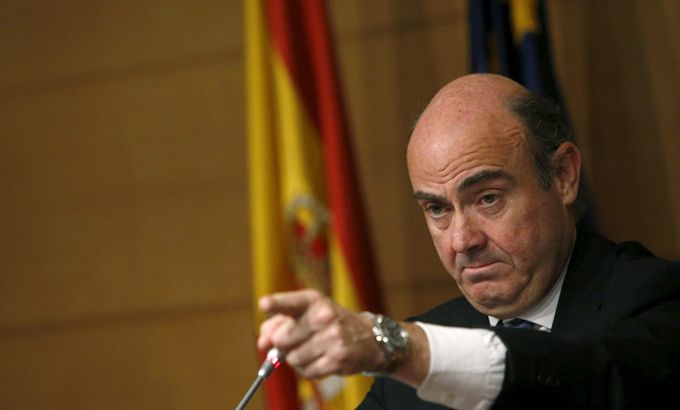Spain to access eurozone rescue funds
European finance ministers say they are ready to lend up to $125bn as Madrid seeks bailout for country’s ailing banks.

Spain is to ask for a bank bailout from the eurozone, becoming the fourth and largest country to seek help since the single currency bloc’s debt crisis erupted.
Luis de Guindos, Spain’s economy minister, told a news conference in Madrid on Saturday that the country had “declared its intention to request European financing for the recapitalisation of those banks that need it”.
| Bailouts at a glance |
|
|
De Guindos said the aid would go to the banking sector only and would not come with new austerity conditions attached for the economy in general.
“There are no conditions of any kind on economic reforms outside of the financial sector,” he said.
The minister said it was not yet clear whether the bailout would come from the European Financial Stability Facility (EFSF) or the European Stability Mechanism (ESM), the two structures set up in the European Union to deal with debt crises.
The EFSF was set up by eurozone states in 2010 to provide loans to countries in financial difficulties and recapitalise financial institutions via loans to governments.
It is backed by guarantee commitments for a total €780 billion and has a lending capacity of €440 billion, and issues bonds on the capital markets.
The ESM, agreed to by eurozone finance ministers last July, is due to replace the EFSF by July 2013 and will provide a permanent rescue fund for eurozone and non-eurozone EU countries. But the treaty creating it needs to be ratified by all eurozone member states before the end of 2012.
He gave no figure as to how much Spain would request, saying that he would wait until independent audits of the country’s banking sector had been carried out before asking for a specific amount.
But he said that the amount of the rescue, up to a maximum of 100bn euros (about $125bn), would be more than enough and provide a margin of security that no one could question.
Finance ministers from the 17 countries that use the euro on Saturday said they were ready to give Spain up to $125bn in a bailout.
“The Eurogroup has been informed that the Spanish authorities will present a formal request shortly and is willing to respond favourably to such a request,” a statement from the group said .
The statement said the money would come from Europe’s bailout funds and that the loan should include current needs and also a “safety margin”.
Protesters were on the streets of Madrid within hours of the announcement. Members of the Indignando movement and their supporters said suffering citizens should benefit from international aid, not financial insitutions.
‘No choice’
The announcement by the Spanish minister came after eurozone finance ministers on Saturday ended two-and-a-half hours of emergency talks, via conference call, aimed at bailing out the country’s troubled banks.
“During the course of the afternoon in Brussels there has been a conference call taking place between the 17 finance ministers of the Eurogroup, including of course the Spanish finance minister, talking about the nuts and bolts of what a bailout might look like, what terms might be attached to it, and how big it might be,” Al Jazeera’s Jonah Hull reported from Madrid earlier on Saturday.
On Friday, the International Monetary Fund released a report which estimated that Spanish banks needed at least a 40bn euro (about $50bn) capital injection following a stress test it performed on the country’s financial sector.
Madrid had until Saturday been reluctant to admit to needing any kind of external assistance, or a bailout, because of the political and economic stigma attached to such a move, our correspondent said.
“It is becoming increasingly clear that the government here doesn’t really have a choice … The Madrid government simply doesn’t have that kind of money and this banking crisis has to be solved,” Hull said.
IMF chief Christine Lagarde hailed what she called the “credible” 100bn-euro financial lifeline Spain sought from the eurozone.
“I strongly welcome the statement by the Eurogroup, which complements the measures taken by the Spanish authorities in recent weeks to strengthen the banking system,” Lagarde said on Saturday.
Meanwhile, the European Commission welcomed Spain’s request for aid for its banks, while Timothy Geithner, the US Treasury secretary, called the move an important step toward financial union.
“These are important for the health of Spain’s economy and as concrete steps on the path to financial union, which is vital to the resilience of the euro area,” Geithner said in a statement.
Wolfgang Schaeuble, the German finance minister, said: “I welcome, like other Eurogroup colleagues, the Spanish government’s determination to recapitalise [the banks] via the European rescue funds EFSF or ESM with corresponding conditions.”
Finland’s public broadcaster YLE reported Jutta Urpilainen, the country’s finance minister, saying Finland would demand collateral from Spain if the country received aid through the EFSF.
 Spain
Spain Greece
Greece Ireland
Ireland Portugal
Portugal